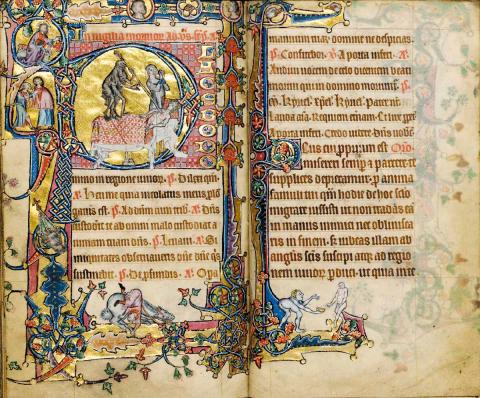
Macclesfield Psalter saved for the Nation
Following the launch last September of a high-profile Art Fund campaign to save the export-stopped Macclesfield Psalter, this remarkable medieval manuscript has been secured for the Fitzwilliam Museum, Cambridge.

£1.7million had to be found by the 10 February 2005 deadline, and the money has finally been raised with just two weeks to go. If the Fitzwilliam’s bid to buy the Psalter had failed, it would have departed for the
The campaign, which kicked-off with a £500,000 grant from the independent charity the National Art Collections Fund (Art Fund), captured the public imagination. The Macclesfield Psalter’s illuminations demonstrated just how extraordinary the world of the medieval imagination could be, from the macabre to the exuberant. When the Art Fund launched a public appeal on the BBC’s Culture Show, people responded enthusiastically with donations ranging from £1 to an anonymous contribution of £15,000. The public appeal raised £180,000 in all. The National Heritage Memorial Fund – the Government’s heritage fund of last resort – also played a crucial role, awarding a major grant of £860,000 which gave a tremendous mid-way boost to the fundraising attempt and brought the target within reach. The Fitzwilliam and its Friends allocated £150,000 from their own funds, and many other trusts and foundations generously added their support.
David Verey, Chairman of the National Art Collections Fund, said: “The export stop placed on the Macclesfield Psalter last year presented us with an irresistible opportunity to secure something of unique national interest. This devotional manuscript is an outstanding example of English artistic mastery – dating from one of those rare periods when English artists were the pride of
Liz Forgan, Chair of the National Heritage Memorial Fund (NHMF), said: “I can think of no better way to kick-off the 25th anniversary year of the National Heritage Memorial Fund than with the news that the Macclesfield Psalter is taking up permanent residence in the
Duncan Robinson, Director of the
James Stourton, Deputy Chairman of Sotheby's
The Macclesfield Psalter was sold to the Getty Museum, California, at Sotheby's in June for £1.7million. However, the Government’s export review system, which recognised the outstanding importance of the Psalter to this country, gave the Fitzwilliam the chance to match this sum. Indeed, the manuscript contains some of the most remarkable examples of English painting before the age of Constable and Turner. It is a jewel-like treasury, consisting of 252 richly-illustrated pages, each a work of art in itself. The manuscript is also a fascinating record of medieval English humour, teeming with highly bizarre and imaginative marginal illustrations. These images, possibly designed to ward off evil (or hold the reader’s attention if it happened to wander from more spiritual matters), include grotesques with faces in their bottoms, strange naked wild men, a dog dressed as a bishop, a trouserless man pulling a dragon’s tongue, and an astonishingly naturalistic giant skate which swims across the page.
The Psalter was produced in the 1320s, probably at Gorleston, at a time when
The Psalter was possibly commissioned by the 8th Earl of Warenne, who was a commander of armies in Scotland and Aquitaine, who was closely involved in the affairs of King Edward II, and whose other claim to fame is that he was excommunicated for multiple adultery. The numerous rabbits in the border (rabbits were a common symbol of lust) are often depicted by their warrens, possibly a pun on the family name. The Earl of Warenne also commissioned the famous Gorleston Psalter in the
For further information and selected high resolution images please contact
Notes to editors
National Art Collections Fund
The National Art Collections Fund (Art Fund) was founded in 1903. It is the
The Fitzwilliam Museum
The
The Fitzwilliam’s treasures range from Ancient Egyptian, Greek and Roman antiquities to the arts of the 21st century and include one of the finest collections of medieval and renaissance manuscripts in Britain – over 1,000 spanning the period from the ninth to the sixteenth centuries and representing all major schools of European illumination. The
Further information
If you have any queries please call the NHMF press office:
Katie Owen or Sam Goody, NHMF Press Office
Phone 020 7591 6036/33.
The Fitzwilliam Museum
Phone:01223 332941/332900.

